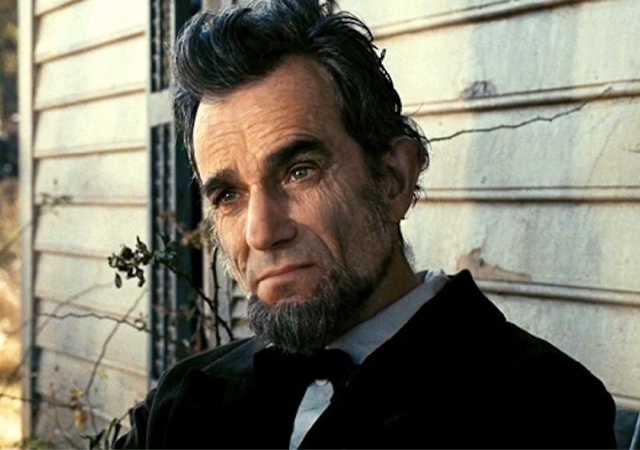
I’m a big fan of The West Wing, and this was rather like a period version of Aaron Sorkin’s political drama. In many ways, that’s high praise, but there’s something rather small-screen about this film. My friend James argued that it never quite shakes the feeling of being a glorified TV movie, and it’s certainly a talker.
Director Steven Spielberg restrains himself from giving it a more epic cinematic sweep and scope to focus on Lincoln’s fight to abolish slavery. But it can’t make up its mind whether to focus on being a biopic of Lincoln or on the passage of the Thirteenth Amendment to abolish slavery. It tries to do both, but doesn’t quite succeed in finding the central focus it needs.
Daniel Day-Lewis puts in an impressive, Oscar-winning performance as Abraham Lincoln. It hints at some of the complexities of Lincoln’s character and political career – his relationship with his wife gets a fair amount of screen time, and some of his more controversial actions such as suspending various legal rights and liberties in the course of the war are referenced briefly. But overall it’s very reverential – this is Lincoln the American icon.
This reverence may come at the expense of historical accuracy. Lincoln is portrayed as an implacable, lifelong opponent of slavery. I’m no expert on the man or on the American Civil War, but from what I understand, Lincoln’s initial stance on slavery was quite moderate rather than one of lifelong opposition. He came to oppose slavery, but his overriding motivation was actually the preservation the Union. The film has Lincoln willing to prolong the war and risk peace in order to ensure the abolition of slavery, which might make for heightened drama but may be an idealisation of the character.
The film poses an intriguingly complex moral question regarding bringing an end to slavery through underhand political wheeler-dealing. Does the overwhelming evil of slavery justify all the political shenanigans to get the Thirteenth Amendment passed? The film doesn’t really allow any answer other than “yes” though. When the Thirteenth Amendment does finally pass, it’s a wonderful moment of joy, as liberty rings out across the land. This is as it should be, of course. I’m profoundly grateful that slavery did come to an end, and it carries with it a foretaste of the Gospel hope of the day of freedom for all captives everywhere.
But perhaps the film makes the situation too neat and tidy: the passing of the Amendment is built up as a crucial make-or-break, now-or-never moment. The film doesn’t voice the possibility that it may have been better for slavery to have died more slowly, rather than amid the humiliation of defeat. Was it really worth the violence of the Civil War to bring about the end of slavery, or could there have been another way, one that could have led to a less bitter road to civil rights and racial reconciliation in the 20th century? Uncomfortable questions, but I’d rather the film explored these complexities rather than simply presenting the end as justifying the means.
I’ll have to read up on this more before coming to a fully informed judgment though. I’ve never properly studied the American Civil War, but it’s one I could do with understanding better. The film may err on the side of hagiography, presenting us with Saint Lincoln, Lifelong Abolitionist, but it’s an engaging and compelling window into this vital moment in modern history.

